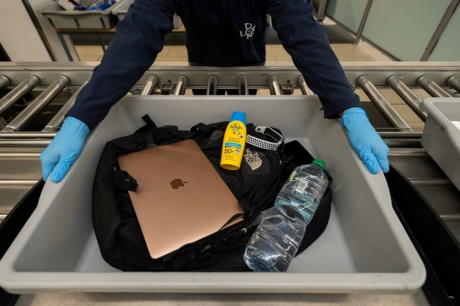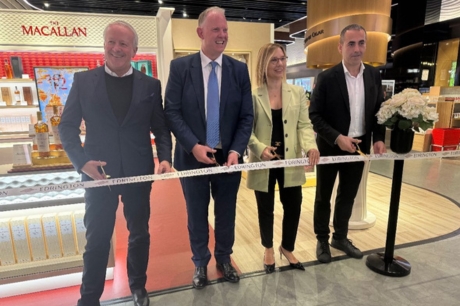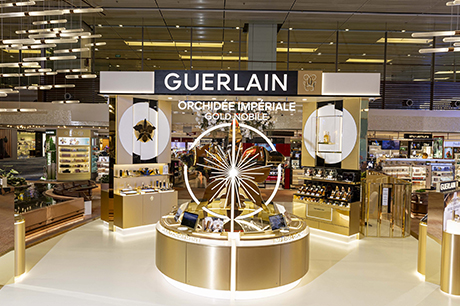LAGs: How will the UK’s phased end to security restrictions impact customers?
By Kristiane Sherry |

From June 2024, LAGs and laptops will no longer need to be removed from bags and the 100ml liquid container limit will be extended to two litres. Source: London City Airport.
Earlier this month, London City Airport (LCY) became the first major player in the UK to end hand-luggage limits for 100ml liquids, aerosols and gels (LAGs). But will the phased introduction of new scanners cause more passenger confusion than relief? And what about the implications for DF&TR?
“We have always prided ourselves on embracing innovation and being early adopters,” said Alison FitzGerald, London City Airport Chief Operating Officer, on the day the shiny new CT scanners went live. It was a big moment in the UK’s quest to end the hand luggage restrictions in place since a foiled 2006 terror attack. The government has set a deadline of June 2024 for every airport to install new security technology after parliamentarians laid new legislation in December to make it easier to streamline processes.
So what’s changed as of now? At London City, passengers no longer need to remove their LAGs from their hand baggage. Gone too is the 100ml limit – instead, they’ll be able to bring up to two litres in carry-on. Laptops, tablets and other electrical items can stay in bags, too. It’s all thanks to the introduction of advanced CT scanners. Not only will repacking in line be a thing of the past, City says the new scanners can process up to 30% more passengers every hour. It’s a big win for consumers (and those of us who travel frequently for business – collective sighs of relief all round).
But the introduction isn’t uniform and changes will be gradual. City have the prize for being the first, but there’s still over a year before every UK airport will have to ‘up’ their scanner game. Will passengers be confused by the changes? And what could it mean for liquid purchases in travel retail stores?
Getting the messaging right
The key piece of advice – which, from glancing at media headlines, isn’t being shouted about enough – is that for the vast majority of customers, air travel needs to carry on as usual and current rules will continue to apply until the changes are implemented.
“Passengers travelling from other airports should continue to always check the necessary guidance on security procedures at those airports before travelling,” said Aviation Minister Baroness Vere.
Edinburgh Airport is already getting across the communication. “We’re reminding passengers that there’s no current change to the rules at Edinburgh Airport,” a spokesperson told TRBusiness. For them, social media is playing a vital role. “Prepare for security as normal” is the language of Twitter. It says it will adopt the new scanners in line with the changes next year, and will announce when passengers can leave their laptops and LAGs in their bags.
Meanwhile, London’s Gatwick Airport is trialling the tech through one security lane. While some lucky passengers will be spared the grand unpacking, the airport told TRBusiness: “The vast majority of passengers at Gatwick will experience security as normal, so should continue to follow all existing rules.”

Will changes to liquids impact how consumers buy liquor, cosmetics, fragrances and other products in travel retail?
But what about once the new scanners are fully in place? Does the airport think passengers will be as likely to buy in travel retail, given they could easily store a bottle from home?
“We are confident that the wide range of products and extremely competitive price of liquor – in comparison to the high street – within our World Duty Free stores will ensure that the offer remains compelling to our passengers,” the spokesperson continued. Price could need to become a key messaging point as convenience becomes less of a driver.
AGS Airports, which operates Aberdeen, Glasgow and Southampton, told TRBusiness it is expecting to meet the new security guidelines “ahead of the required deadline”. Meanwhile, Bristol Airport confirmed it had yet to announce a date. Heathrow said it has more security lanes than”all other UK airports”, so installing the new technology would be “complex and take longer”.
While in the changeover period, it seems prudent for UK travel retail and airport stakeholders to bolster their customer communications. Using the time to develop consumer marketing campaigns to reposition the advantages of travel retail shopping post-LAGs restrictions removal would also be wise…
Stay close to TRBusiness for more as this story develops. For further background, click the respective links below:
Liquid restrictions in UK ‘could end in two years’ time’
UK to streamline liquids and laptops security rules at airports by June 2024
TR Consumer Forum: Agenda & speakers revealed
Influential speakers will unpack the most effective strategies for understanding and engaging...
OUT NOW: March/April Leading Americas Operators
The TRBusiness March/April 2024 edition boasting the inimitable leading Americas Operators...
Saudia Arabia's KKIA unfurls T3 duty free expansion
King Khalid International Airport (KKIA) has unveiled the first stage of its much-vaunted duty...

In the Magazine
TRBusiness Magazine is free to access. Read the latest issue now.

 Trbusiness. The travel retail Trbusiness. The magazine for global retail and duty free professionals.
Trbusiness. The travel retail Trbusiness. The magazine for global retail and duty free professionals.





















